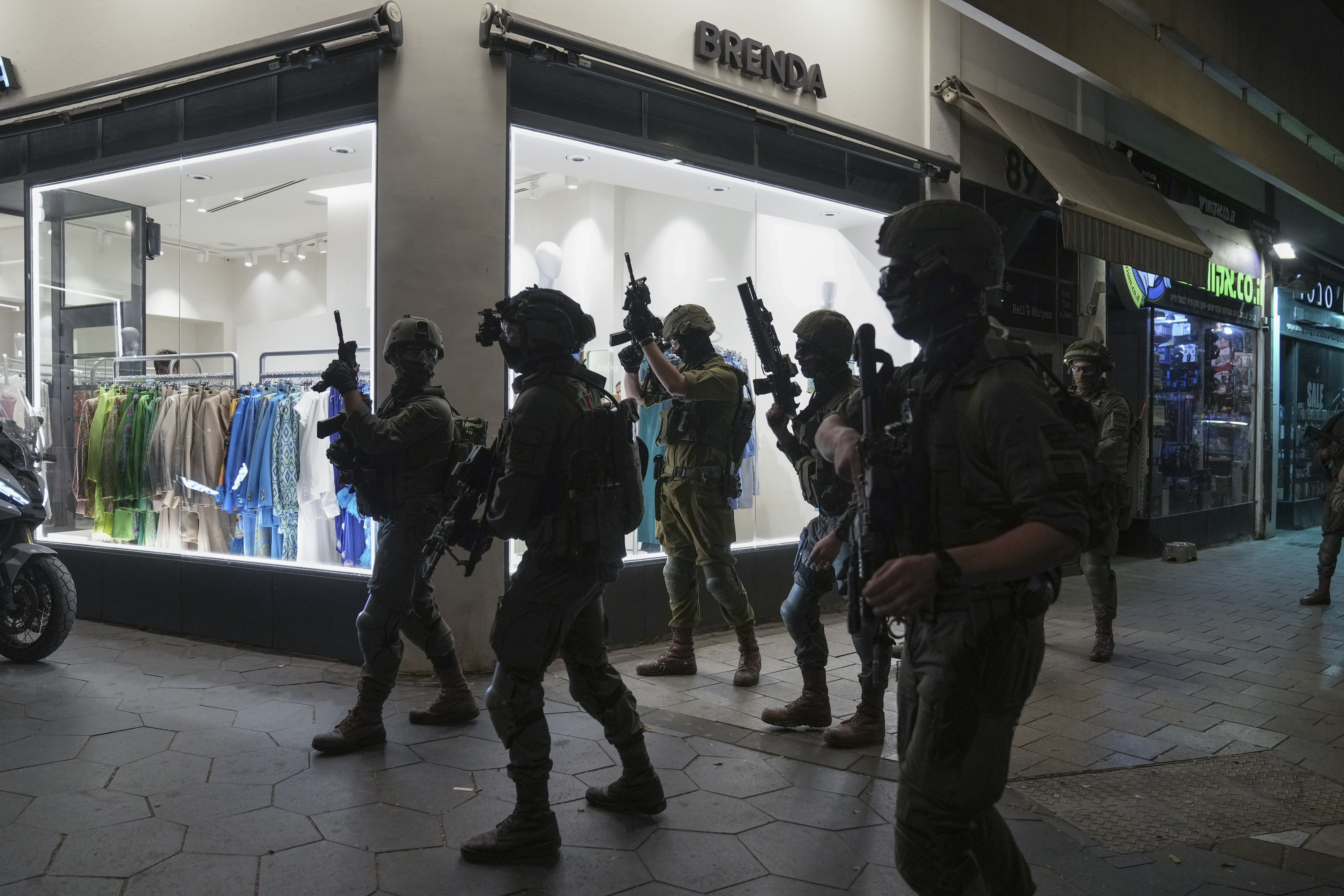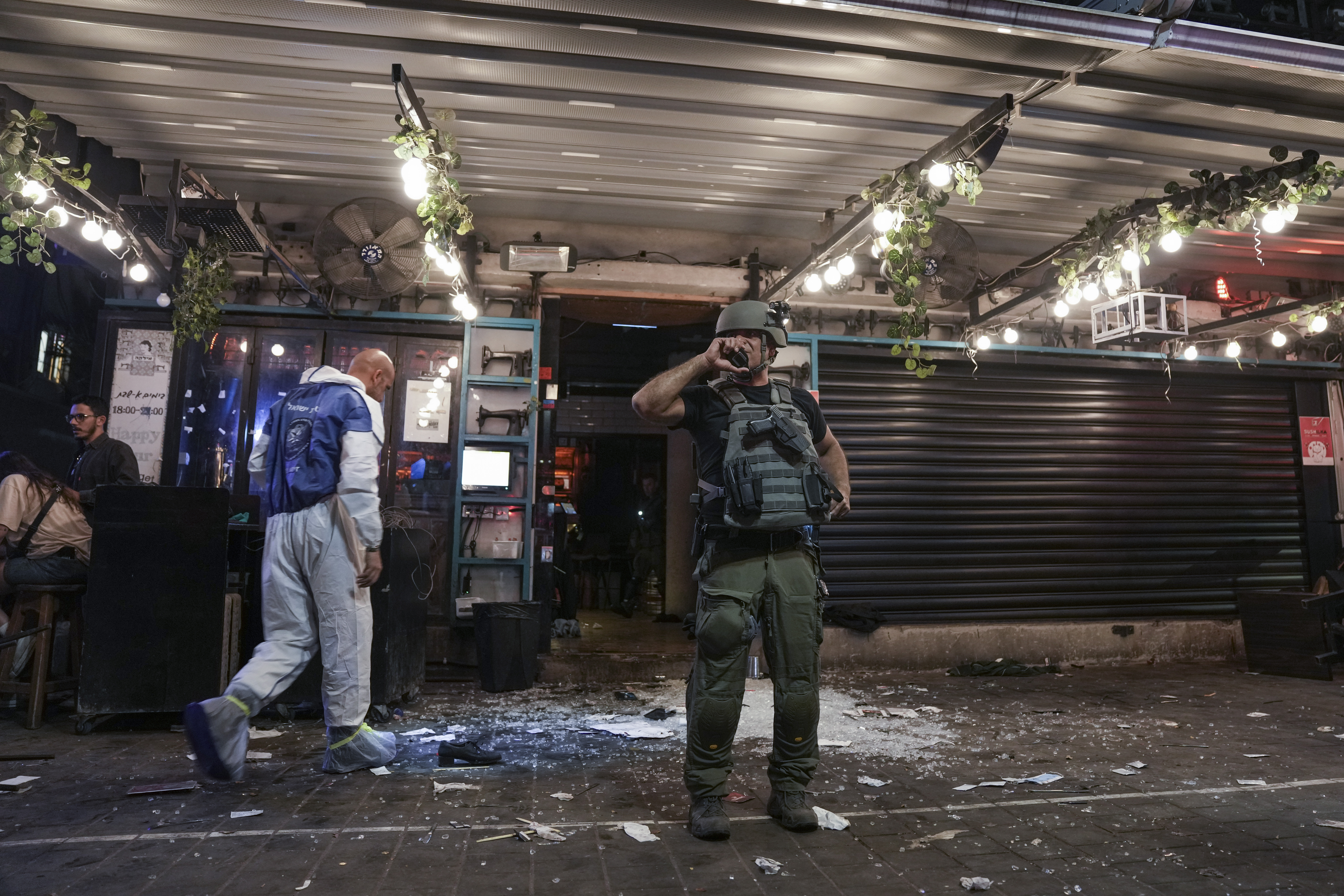
A third Israeli has died following an attack by a Palestinian man who opened fire into a crowded bar in Tel Aviv a day earlier.
A Tel Aviv hospital on Friday afternoon announced that Barak Lufan, 35, who was wounded in the shooting had succumbed to his injuries.
The other two who died in Thursday’s shooting were two men; one aged 28 and the other aged 27, according to the Haaretz newspaper. At least 10 people were wounded.
The suspected gunman was shot dead by police near a mosque in Jaffa early on Friday morning after a massive manhunt by hundreds of officers, some with dogs, and army special forces who searched building by building through the densely populated residential neighbourhoods.
Israeli police said the gunman was Raad Hazem, a 28-year-old Palestinian from the occupied West Bank city of Jenin, and that he was the only suspect.
Amichai Eshed, the Tel Aviv police commander, said the shooter opened fire into a crowded bar at around 9pm (18:00 GMT) on Thursday and then fled the scene.
Israel’s Magen David Adom emergency service said it received reports of a shooting at “several scenes” around the centre of Tel Aviv. At least one attack took place on Dizengoff Street, a central thoroughfare and popular weekend hangout.
Police update reporters on Tel Aviv shooting attack:
One gunman suspected, who fled from the scene and is still at large, with hundreds of police officers fanning the area.
They believe he remains in the area and they ask residents to stay home.
— Amy Spiro (@AmySpiro) April 7, 2022
The motive for the shooting was not immediately clear, but tensions have soared following recent attacks by Palestinians that have killed 11 people in Israel.
On Friday, Israeli Prime Minister Naftali Bennett met top security officials and announced that a major crossing in the north of the occupied West Bank near the attacker’s hometown would be closed indefinitely.
“Every murderer will know that we’ll get to him, and anyone who helps terrorists should know that the price he will pay will be unbearable,” Bennett said in a statement.
“We are granting full freedom of action to the army, the Shin Bet and all security forces in order to defeat the terror,” Bennett added. “There are not and will not be limits for this war.”
On March 22, four Israelis were killed in a stabbing attack in Be’er Sheva.
Five days later, two border police officers were killed in a shooting attack in Hadera. On March 30, two Israelis, two Ukrainian nationals, and a police officer were killed in a shooting attack in Bnei Brak.

Outside a Tel Aviv café where shattered glass on Thursday carpeted the ground outside the entrance, a man comforted a woman sitting on a barstool.
“It’s an atmosphere of war. Soldiers and police are everywhere,” said Binyamin Blum, who works in a restaurant near the scene of the attack.
Reporting from West Jerusalem, Al Jazeera’s John Holman said the area where the shooting took place was “full of bars and cafes” frequented by many people.
“Israel has been sending more police, more security forces out onto the streets, and the prime minister said in the last week or so that anyone who has a gun licence should be carrying their weapon,” Holman said.

The last time such violence happened on Tel Aviv’s Dizengoff street was in 2016 when two people were killed and several wounded in a shooting attack at a bar. The attacker was killed several days later after he escaped the scene.
United States and European envoys to Israel condemned Thursday’s shooting. In a statement, Secretary of State Antony Blinken said the US was “closely following developments” and was in “regular contact with our Israeli partners, with whom we stand resolutely in the face of senseless terrorism and violence.”
Horrified to see another cowardly terror attack on innocent civilians, this time in Tel Aviv. Praying for peace, and sending condolences to the victims and their families. This has to stop!
— Ambassador Tom Nides (@USAmbIsrael) April 7, 2022
The Hamas group that rules the besieged Gaza Strip praised the attack but did not claim responsibility. “Resistance operations are a natural response to Israel’s crimes against the Palestinian people,” senior Hamas official Mushir al-Masri told Al Jazeera.
Last year, Israel bombarded Gaza for 11 days after protests and clashes during the Muslim holy month of Ramadan.
Israeli, Jordanian and Palestinian leaders have held a flurry of meetings in recent weeks, and Israel has taken a number of steps aimed at calming tensions, including issuing thousands of additional work permits for Palestinians from the Gaza Strip.
Prior to the attack, Israel had said it would allow women, children and men over 40 from the occupied West Bank to pray at the Al-Aqsa Mosque in East Jerusalem on Friday, the first weekly prayers of Ramadan.
Tens of thousands were expected to attend.
Israel captured occupied East Jerusalem, the West Bank and the Gaza Strip in the 1967 Middle East war. The Palestinians want all three territories to form their future state.
The last serious and substantive peace talks broke down more than a decade ago, and Bennett is opposed to Palestinian statehood.







